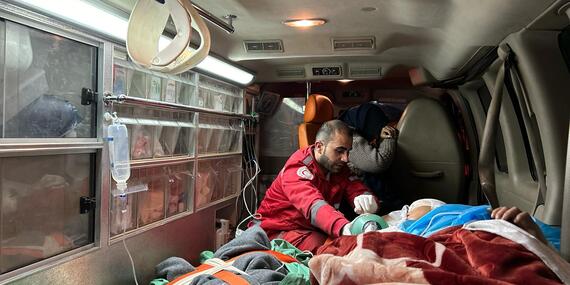Today's top news: Occupied Palestinian Territory, Sudan, Ukraine

Occupied Palestinian Territory
The Palestine Red Crescent Society – with support from OCHA and the World Health Organization – evacuated 72 critical cases from Nasser Hospital in Khan Younis. That hospital still struggles to operate with no electricity or running water, shortages of food and water supplies, the accumulation of solid waste, and the overflow of sewage.
The UN Population Fund (UNFPA) reports that newborns are dying in Gaza because their mothers are unable to attend prenatal or postnatal check-ups, while bombings and anxiety are leading to premature births.
UNFPA says that there are only five beds for deliveries at the Al Helal Al Emirati maternity hospital in Rafah, one of the few remaining functioning hospitals in Gaza. Despite the lack of such basic supplies as sheets, the facility coped with 78 deliveries in one night alone recently.
The protection and safety of humanitarian aid workers and medical personnel continues to be a serious concern amid widespread hostilities and attacks.
We and our partners are doing all we can to provide food assistance across the Gaza Strip, despite major challenges, including ongoing airstrikes and heavy fighting.
Last week, more than a dozen of our partners reached 1.7 million people with food across Gaza. Half those supplies went to Rafah Governorate, with nearly half of those supplies going to Rafah Governorate and the rest to Deir al Balah, Khan Younis and the north.
To do more, we need safe and unimpeded routes in Gaza. We also need more trucks and fuel inside Gaza to ensure a consistent and dependable food supply.
Sudan
The Humanitarian Coordinator in Sudan, Clementine Nkweta-Salami, has expressed her alarm at reports of attacks on volunteers working with civil society organizations, including community-based groups knows as the Emergency Response Rooms.
In a statement yesterday, she said local responders in Sudan must be able to safely carry out their critical and life-saving work. Whether they are from the UN, non-governmental organizations or community groups, national staff and local volunteers are on the frontline of the humanitarian response in Sudan.
Ms. Nkweta-Salami reiterated that civilians – including humanitarian workers – are not a target.
Ukraine
A new wave of attacks over the weekend and today across the country caused civilian casualties and damaged civilian infrastructure.
According to national authorities, twelve regions were impacted, with 50 civilian casualties reported. Grain stocks, education facilities and a railway station were also reportedly damaged.
In the Donetsk region in the east, local authorities and humanitarian workers reported civilian deaths and injuries, along with damage to hundreds of homes and other civilian infrastructure. The water network was also damaged, temporarily reducing the water supply to large urban centres.
In the south, in the Kherson Region, authorities also reported civilian casualties and damage to a gas pipeline, among others.
Humanitarian workers and local emergency responders have rapidly mobilized support, including by providing repair materials and shelter kits in the Donetsk Region.
Still on the response, an inter-agency convoy led by the Humanitarian Coordinator, Denise Brown, today delivered vital aid to the town of Mylove in the Kherson Region. This included portable power stations, solar lamps and hygiene items.
